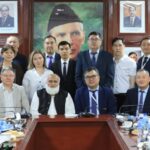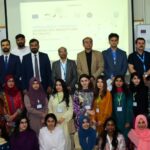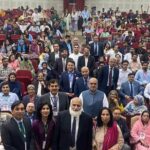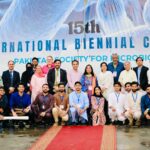Globalization, militarization, limits to growth theory biggest challenges for developing countries: Dr Shahida Wizarat
Many economists in the world today were contesting globalization and were increasingly seeing it as a process of vast, systematic, institutionalized and legitimized plunder of the Third World countries, which have been developed into a condition in which their productive capacity, their land, labour, forests, and fisheries now produce mostly for the benefit of a relatively few rich people elsewhere.
This was stated by eminent economist Professor Dr Shahida Wizarat in a lecture organized by Institute of Policy Studies (IPS) at the School of Economics, Quaid-i-Azam University (QAU). The lecture titled “Challenges Faced by the Developing Countries and Our Response” was part of a lecture series on the theme of “Pakistan Economy in a Transforming Global Economic Order”.
Quoting various economists such as Ukpere, Slabbert, Haines and Trainer she said that there was overwhelming evidence for a positive correlation between globalization, internationalization and unemployment. Their studies show that global unemployment has increased the rate of global inequality and the gap between the “global rich” and the “global poor” continues to grow, she added.
Dr Wizarat lamented that Transnational Corporations (TNCs) instead of Third World governments were dictating Third World development, with the latter unable to direct foreign investment towards the needs of their citizens and prevent actions that hurt their national interests. An example of this is the tremendous increase in Genetically Modified crops acreage in the LDCs which according to the FAO has surpassed their acreage in the DCs, she said.
She told the audience that developed countries exporting GM food to developing countries have very strict laws about the consumption of these food products in their own countries. In most of these countries their consumption is strictly forbidden. She criticized the recent amendment in Pakistan Seed Act to facilitate GMOs and termed it as a legislative disaster that will have severe effects on the textile sector and food security of the country.
The second biggest challenge, according to Dr Wizarat, the developing countries were faced with was widespread and endemic conflict and militarization. Countries across Asia, Africa, Middle East, etc, were engaged in sectarian, ethnic and ideological conflicts. A common feature of these conflicts was that populations were polarized systematically into ethnic, sectarian and ideological groups with intensities varying in different countries. Some countries were in the fore front, others were somewhere in the middle, where conflict was brewing up, but has yet to result in open warfare. And some were on the back burner where seeds for polarization were now being sown. Quoting her own study of 2014, she claimed that one percent increase in world conflict increases GDP of developed countries by 7.7 per cent, while resulting in decline in developing countries’ GDP by 3.8 per cent.
The third challenge described by her was on account of limits to growth theory. Quoting Jeffry Sachs, a leading US economist, she said that it would not be sustainable if the developed countries continue to grow at their long-term per capita rate of 1.6 per cent, while the countries in Asia and other parts of the world continue to grow at their spectacular rates resulting in four to six fold increase in world’s GNP. She was of the view that limits to the growth model was the biggest challenge to globalization. The limits to growth analysis has given rise to the policy recommendation that the trade-off between the rates of growth of rich western countries and the emerging Asian countries has to be settled at the cost of sacrificing Asian rates of growth. She urged that we, as a nation, should be aware of these facts and preempt the polarization of our country into sectarian, ethnic, ideological and political groups. Each one of us will have to play our role to preempt the polarization, which will be nurtured and fanned by outsiders who benefit from conflict.
 PM’s Laptop Scheme’s Provisional List has been shared with Department Focal Person. Check your status, please
PM’s Laptop Scheme’s Provisional List has been shared with Department Focal Person. Check your status, please







